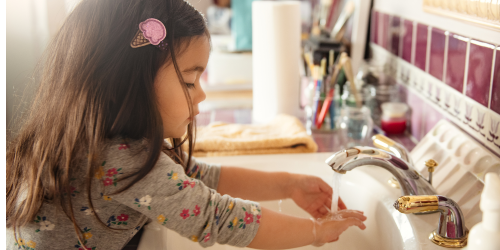How do I avoid bringing germs into my home?
Early information out of China, where COVID-19 first started, shows that some people are at higher risk of getting very sick from this illness. This includes:
Individuals at a higher risk of developing complications from COVID-19 should:
Many patients with COVID-19 can recuperate at home. If you or a loved one is sick, there are some steps that can help reduce the spread of illness to other family members:
- Shoes bring many germs into our homes. If you’ve been in an area with sick people, leave your shoes outside, or clean them with a disinfectant wipe before bringing them into the house. Don’t wear shoes inside your house or allow others to do so.
- Wash your hands right away when you get home. Dedicate a space for backpacks, coats, and purses and don’t put those items near where you eat.
- Clean your cell phone and devices regularly. Avoid holding your cellphone close to your face; use speakerphone or earbuds for phone conversations.
- Every member of the home should practice good hand and oral hygiene. Cover coughs and sneezes. Avoid touching your face with unwashed hands.
- Have dedicated spaces for eating and regularly clean them. Wash anything used to prep or serve food in hot water.
- Clean high-touch surfaces daily with disinfecting wipes or sprays, and don’t forget doorknobs and devices.
- Opening a window or running the furnace fan can help keep the air healthier.
- Don’t share hand or body towels with other family members. Change towels and bedding regularly, and wash towels, bedding, and underwear in hot water.
Early information out of China, where COVID-19 first started, shows that some people are at higher risk of getting very sick from this illness. This includes:
- Older adults
- People who have serious chronic medical conditions like:
- Heart disease
- Diabetes
- Lung disease
Individuals at a higher risk of developing complications from COVID-19 should:
- Stock up on supplies (food, water, medications, tissues)
- Take everyday preventive actions like washing your hands for 20 seconds
- Avoid people who are sick
- Avoid cruise and air travel
- Stay home as much as possible and avoid crowds
- Stay in touch with friends and family by phone or email
Many patients with COVID-19 can recuperate at home. If you or a loved one is sick, there are some steps that can help reduce the spread of illness to other family members:
- If possible, the sick person should not share a bed or bedroom with anyone else. They should have their own pillow and bedding.
- Give the sick person his or her own dedicated soap and towel (or sanitizer) for hand hygiene.
- Wash any plates, utensils, towels or washcloths used by the sick person in hot water.
- Oral hygiene is especially important when you’re ill. Brush teeth frequently and use mouthwash. Once you’re feeling better, dispose of your toothbrush or boil it in hot water for 3 minutes.
- If possible, dedicate a room to the sick person. Bring food and drink to them instead of having them move through the home.
- Place used tissues in trashcans with plastic liners or a plastic bag.
- Wash your hands after touching something used by the sick person.
- If ill, stay home unless you need to seek medical care. Unless it’s an emergency, call before coming in, or consider a virtual visit.
Visit the Carle COVID-19 Resource Page
Categories: News
Tags: chronic medical conditions, COVID-19, diabetes, family, heart and lung disease, safety
